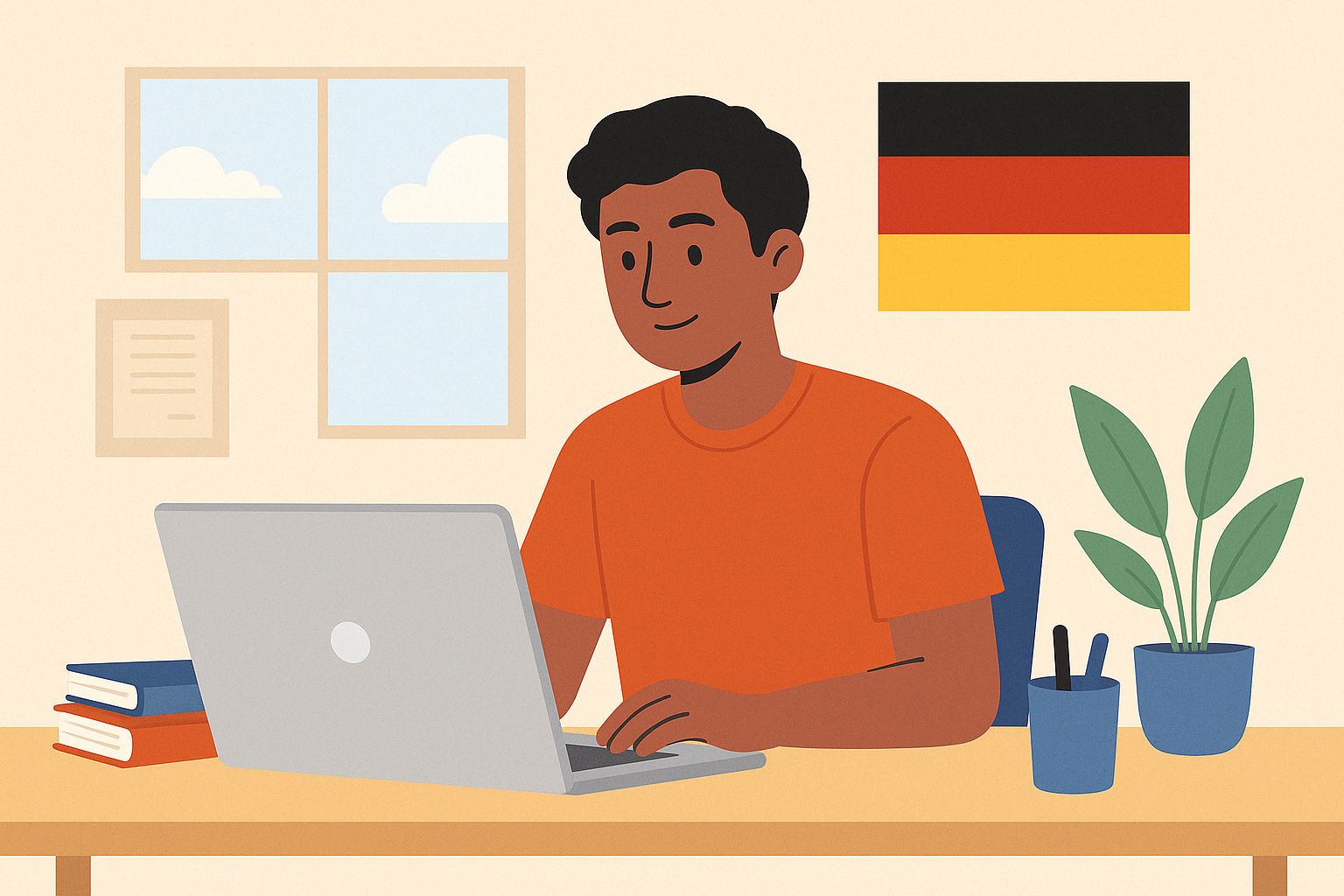DAAD India: Scholarships and Programs for Indian Students
Introduction to DAAD India and Its Mission
DAAD India: For thousands of ambitious Indian students, DAAD India represents an essential gateway to international education. As the regional office of the German Academic Exchange Service, DAAD India plays a crucial role in connecting Indian scholars with top universities, researchers, and institutes across Germany. With a focus on DAAD scholarships, DAAD international programs, and academic advisory services, it opens life-changing academic and professional opportunities for Indian applicants.
Contact us for a free demo class at the Indian Institute of Foreign Languages to explore our German language programs and get language learning guidance from certified trainers.
At the Indian Institute of Foreign Languages (IIFLS), we help students build a strong foundation through certified German language training and documentation support aligned with international academic standards.
DAAD India and the Role of German Academic Exchange for Indian Students
DAAD India operates under the larger umbrella of the German Academic Exchange Service, one of the most respected academic bodies in the world. Its goal is to foster international collaboration in education and research. DAAD India provides Indian students with:
-
Updated information on higher education opportunities
-
Structured guidance on eligibility, admission, and visa processes
-
Application assistance for DAAD international programs
-
Regular webinars, online events, and counselling sessions
By serving as a regional bridge, DAAD India enables smoother access to globally renowned universities and world-class research centers.

Comprehensive DAAD Scholarships Offered Through DAAD India
One of the core offerings of DAAD India is financial aid. Every year, hundreds of Indian students benefit from well-structured DAAD scholarships that cover tuition, living expenses, travel, and even language training. Some of the most prominent funding options include:
1. DAAD WISE – Research Internships in Science and Engineering
This competitive DAAD scholarship supports Indian undergraduates in STEM fields by funding their short-term research internships at German universities. The program is managed and promoted directly through DAAD India.
2. EPOS – Postgraduate Programs for Professionals
DAAD India facilitates applications for the EPOS program, which is tailored for Indian professionals with a minimum of two years of work experience. This fully funded DAAD scholarship covers Master’s-level education in areas such as renewable energy, engineering, and economic development.
3. Helmut-Schmidt Programme – Public Policy and Good Governance
This prestigious program enables future leaders in law, administration, and policy to undertake their Master’s studies in Germany. DAAD India coordinates this program in South Asia, offering financial support, orientation, and even preparatory language training.
All DAAD scholarships promoted by DAAD India are merit-based and require strong academic records, professional relevance, and language competence.
Benefits of DAAD International Programs Beyond Financial Support
While DAAD India is known for offering generous scholarships, it also administers a wide portfolio of DAAD international programs designed to build global competencies.
These include:
-
Joint degree programs between German and Indian universities
-
Summer schools for advanced academic exposure
-
Guest lectureships and research visits
-
Faculty exchange and collaborative academic projects
Through these DAAD international programs, DAAD India empowers Indian students to explore multicultural environments, develop interdisciplinary skills, and network with scholars from across the world.
German Language Training – A Key Requirement for DAAD India Scholarships
Even for English-taught courses, German language proficiency can significantly strengthen your application and improve day-to-day communication in Germany. Some DAAD scholarships even include a fully funded 6-month language course in Germany before the academic session begins.
At Indian Institute of Foreign Languages, we support this requirement by offering:
-
German levels A1 to C2 with flexible batch timings
-
Online and offline classes led by certified trainers
-
Full preparation for Goethe, TELC, and TestDaF exams
-
SOP and resume writing assistance
-
APS and visa document guidance
You can begin your journey by booking a free demo class for German online language courses with our experienced team.
How DAAD India Supports the Application Process
DAAD India simplifies the application journey through online portals, digital events, and publications. From program search to admission timelines, the support provided includes:
-
Free university databases to find the right academic fit
-
Step-by-step application guidance for DAAD scholarships
-
Country-specific checklists for Indian applicants
-
FAQs on academic equivalence, LOR formats, and visa processes
-
Counselling sessions for shortlisting and SOP feedback
With well-planned webinars and in-person events, DAAD India ensures transparency and accessibility for every student.
Eligibility Criteria and Documents Required by DAAD India
Each DAAD India scholarship has specific criteria. However, common requirements include:
-
Academic transcripts
-
Degree certificates
-
Work experience letters (for EPOS and postgraduate programs)
-
IELTS/TOEFL scores or German language proficiency (Goethe/TestDaF)
-
Statement of Purpose (SOP)
-
Letters of Recommendation
-
DAAD application form
Students are advised to attend a DAAD webinar or reach out to the DAAD India helpdesk for program-specific clarifications.
Success Tips for Students Applying via DAAD India
Students preparing for DAAD India programs should focus on:
-
Clear academic goals aligned with the course
-
A well-written SOP showing long-term impact
-
Consistent German language training, even for English-medium courses
-
Active participation in DAAD-hosted information sessions
-
Early application planning, at least 9–12 months in advance
Our team at Indian Institute of Foreign Languages provides one-on-one mentoring and mock interviews to boost student confidence.
Student Testimonials and Experience with DAAD India
Several students from IIFLS who applied through DAAD India have shared positive feedback about their journey. The structured timeline, transparency in scholarship evaluation, and availability of detailed resources make DAAD India a standout support system.
From internship placements to fully funded postgraduate education, the outcomes of partnering with DAAD India are transformational.
Official Platforms and Resources Recommended by DAAD India
All applicants are encouraged to explore the official portals of DAAD India:
Visit the DAAD India official website for scholarship calls and information sessions. Use the DAAD scholarship database to browse through available funding opportunities. For global updates on exchange programs, the German Academic Exchange global portal provides a complete overview.

Conclusion: Begin Your DAAD Journey with the Right Preparation
DAAD India is more than just a scholarship provider—it’s a complete academic support system for Indian students who want to access world-class education and global research opportunities. From DAAD scholarships to short-term training and DAAD international programs, the possibilities are wide-ranging and impactful.
At Indian Institute of Foreign Languages, we help students take confident steps by offering internationally aligned German language training, one-on-one counselling, and expert support. Start now with a free consultation or demo class or to join German classes in Bangalore.
Frequently Asked Questions (FAQs)
1. Who is eligible to apply for scholarships to study in Germany?
Eligibility depends on the type of program and scholarship. Typically, applicants must have completed their undergraduate or postgraduate degrees with above-average grades. Some scholarships may also require relevant work experience, research proposals, or a clear statement of purpose.
2. Do I need to speak German to apply?
Many Master’s programs in Germany are offered in English. However, basic knowledge of German is highly recommended for everyday life, part-time jobs, and cultural integration. In some cases, having German language skills improves your chances of selection.
3. What documents are required when applying for scholarships or university admissions in Germany?
Commonly required documents include:
-
Academic transcripts and degree certificates
-
Statement of Purpose (SOP)
-
Letters of Recommendation (LORs)
-
Curriculum Vitae (CV) in Europass format
-
Proof of language proficiency (English or German)
-
Passport copy
-
Work experience letters (if applicable)
Each scholarship or university may require specific formats, so always check the official guidelines.
4. Can I apply for more than one scholarship at the same time?
Yes, in many cases you can apply for multiple scholarships. However, you can only accept one if selected. Ensure that the scholarships you’re applying to do not have conflicting conditions or deadlines.
5. Is work experience mandatory for applying to postgraduate courses in Germany?
Not always. Some Master’s programs accept students directly after undergraduate studies. However, certain programs—especially those related to business, development studies, or engineering—prefer or require at least 1-2 years of work experience.
6. What is the APS Certificate, and do Indian students need it?
Yes, Indian students applying for higher studies in Germany must obtain the APS Certificate (Akademische Prüfstelle). This certification verifies academic documents and qualifications. It’s now a mandatory step before applying for a German student visa from India.
7. What is the average tuition fee at public universities in Germany?
Public universities in Germany generally do not charge tuition fees for most programs. Students may be required to pay a semester contribution fee (typically between €200 and €350), which covers administrative costs, student unions, and public transport.
8. How much are the living expenses in Germany for a student?
The average monthly cost for a student is approximately €850–€1,000. This includes accommodation, food, health insurance, transport, internet, and miscellaneous expenses. The exact amount depends on the city and personal lifestyle.
9. Can international students work part-time in Germany while studying?
Yes, students from outside the EU/EEA can work up to 120 full days or 240 half days per year without a separate work permit. Part-time work can be found in universities, cafes, tutoring, or internships. Proficiency in German can significantly increase job opportunities.
10. What is the process for applying to German universities?
Here’s a simplified step-by-step process:
-
Shortlist programs and universities using online databases.
-
Check admission and language requirements.
-
Gather necessary documents (SOP, LORs, transcripts, etc.).
-
Apply directly through the university website or Uni-Assist portal.
-
Apply for the APS certificate in parallel.
-
Once admitted, proceed with visa application.
Each university has its own deadline and process, so it’s essential to plan early.
11. Is it possible to stay in Germany after completing my education?
Yes. Graduates from recognized German institutions can apply for an 18-month post-study work visa. This allows them to search for jobs aligned with their qualification. Once employed full-time, individuals can apply for a long-term residence permit.
12. Do German universities offer English-taught programs?
Absolutely. There are over 2,000 programs in Germany taught entirely in English, especially at the postgraduate level. These programs are ideal for international students who may not yet be fluent in German but still want access to German academic excellence.
13. Are German degrees recognized globally?
Yes, degrees from German universities are internationally respected and highly valued in global job markets. Germany’s reputation for engineering, research, and technology makes its graduates especially competitive in industries worldwide.
14. When should I start the application process?
Ideally, students should begin the process at least 9–12 months in advance. This gives ample time to prepare documents, take language tests, complete the APS process, and meet university or scholarship deadlines.
15. Can Indian students apply for funding or scholarships from private institutions or foundations in Germany?
Yes. In addition to government-funded options, many private foundations and research institutions in Germany offer financial assistance. These often have niche criteria such as field of study, nationality, or research topic.


